GALLUP NEWS SERVICE
PRINCETON, NJ -- One result of the GOP's takeover of the Senate and continued control of the House is the Republicans' significantly improved ability to set the congressional agenda and to get their favored legislation passed. Last week, President Bush outlined his party's legislative plans for the current lame duck session of Congress, and the Republican-controlled Congress that will convene at the beginning of the new year. Here's a rundown on how the American public feels about a number of the issues on the congressional agenda, based on our latest CNN/USA Today/Gallup poll completed over the weekend.
Department of Homeland Security
Most reports suggest that quick passage of a bill elevating the Department of Homeland Security to cabinet-level status will be a top priority for Republicans. On Tuesday, President Bush met with lawmakers at the White House to implore them to pass a bill to authorize the creation of the new cabinet department. Bush said that this was "the single most important business" for Congress to tackle.
There is little question that Americans support the concept of a cabinet-level Department of Homeland Security.
| Do you think Congress should -- or should not -- pass legislation to create a new cabinet-level Department of Homeland Security? |
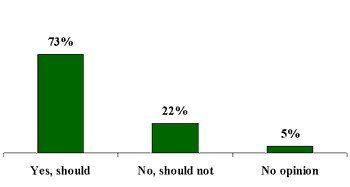 |
| June 21-23, 2002 |
Despite this high level of support, however, we are not finding any signs of increased pressure from the public to pass such legislation quickly. Last June, Americans were evenly divided as to whether or not it was highly important to create a Department of Homeland Security before the end of the year. Fifty-two percent said it was either extremely or very important to do so, while 46% said it was only somewhat or not important. Virtually the same results were found in the current poll conducted over this past weekend. Thus, despite the passage of almost five months and all of the recent discussion and debate about the issue of terrorism, homeland preparedness, and the possibility of new terrorist attacks, the public expresses no greater urgency about the creation of a cabinet-level Department of Homeland Security now than it did last June.
| How important is it to you that Congress pass legislation to create a cabinet-level Department of Homeland Security before the end of the year -- is it -- extremely important, very important, somewhat important, or not important? |
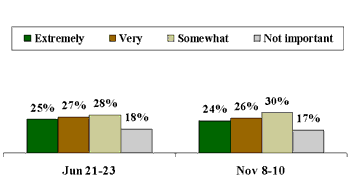 |
There are differences by party in the responses to this question. Sixty percent of Republicans say that it is important to pass Homeland Security legislation before the end of the year, compared with 44% of Democrats.
Tax Cuts
Tax cuts have long been a key Republican issue. President Bush campaigned on the issue of tax cuts in 2000, and he and his fellow Republicans pushed through passage of a major tax cut law last year.
One of the Bush administration proposals has been to pass follow-up legislation to make the tax cuts, which are set to expire in 2011, permanent. There is little opposition to this idea from the American public, two-thirds of whom favor it.
| As you may know, the federal income tax cuts passed into law last year are set to expire in 2011. Would you favor or oppose making those tax cuts permanent? |
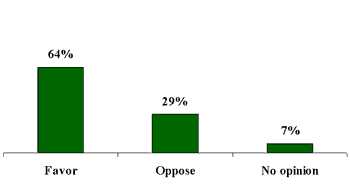 |
| Nov 8-10, 2002 |
But the public is much less interested in new federal income tax cuts in addition to those passed last year. Just 40% favor new tax cuts, while 52% believe that those passed last year are sufficient.
| Would you favor new federal income tax cuts in addition to those passed last year, or do you think the tax cuts passed last year are sufficient? |
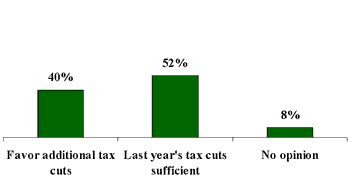 |
| Nov 8-10, 2002 |
This sentiment is generally consistent with Americans' attitudes last year, as the tax cuts were being debated before their eventual passage into law. The public was not overly enthusiastic about tax cuts, nor did they rate them as a high priority. (Some discussion has focused on the idea of accelerating some of the tax cuts promised under last year's law, which technically would not be a "new" tax cut.)
One interesting finding -- Republicans only break even on the idea of new tax cuts; as many Republicans say that the current tax cuts are sufficient as say new tax cuts are needed. Democrats, not surprisingly, oppose new tax cuts by a two-to-one margin.
Bush Energy Policy
Observers have pointed out that the Republican sweep of the House and Senate puts the GOP in a better position to push through some of the administration's energy initiatives -- including expanded drilling in the Arctic National Wildlife Refuge, increased emphasis on energy production rather than conservation, and a renewed emphasis on nuclear power. The new head of the Senate Energy and Natural Resources Committee will most likely be New Mexico Senator Pete Domenici, who is known to favor many of these policies.
Our weekend poll shows no real change in the public's attitude towards what the question describes as "President Bush's plan to deal with the country's current energy problems." The initial Gallup read on this issue back in May 2001 showed that as many Americans opposed as favored Bush's energy plan. By March of this year, 51% said they favored the president's energy policies while 28% opposed, and almost precisely the same distribution of support exists today. A substantial proportion of Americans, nearly one in four, say they have no opinion on the issue.
Based on what you have heard or read, do you favor or oppose President Bush's plan to deal with the country's current energy problems?
|
Favor |
Oppose |
No opinion |
||
|
% |
% |
% |
||
|
(NA) 2002 Nov 8-10 |
49 |
27 |
24 |
|
|
(NA) 2002 Mar 4-7 |
51 |
28 |
21 |
|
|
(NA) 2001 Aug 3-5 |
45 |
40 |
15 |
|
|
(NA) 2001 Jun 28-Jul 1 ^ |
38 |
32 |
30 |
|
|
(NA) 2001 May 18-20 |
44 |
42 |
14 |
|
|
^ (NA) |
Preceded by question asking how closely following the news about President Bush's energy plan. National Adults |
|||
This question mentions President Bush by name, so it is no surprise to find extremely partisan responses. Seven out of 10 Republicans favor the president's energy policies, compared to only one-fourth of Democrats. Regionally, support is highest in the South, and lowest in the East.
Privatizing Social Security
News reports suggest that the Republican push to reform Social Security and allow Americans to put a portion of their Social Security monies into personal retirement accounts will not be a high priority either in the current lame duck session nor perhaps next year. But, interestingly, the public appears to be almost as supportive of this idea now as it was two and a half years ago, at the height of the booming stock market. Support for privatizing Social Security was as high as 65% in June 2000. It fell to 52% by September of this year, following this summer's stock market declines, but is now back up to 57%.
| Favor or Oppose Privatizing Social Security Investment |
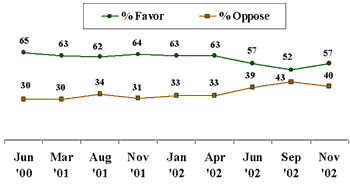 |
The big distinction on this issue is age. Support is very high, at almost the 70% level, among those under 50 years of age. It drops to 53% among those 50-64, and plummets to only 25% among the 65 and older age group.
Judicial Appointments
One of the most significant effects of Republican control of the Senate may relate to the administration's judicial appointments. Confirmation of many of Bush's nominees for federal judgeships has been delayed by the Democratic-controlled Senate. Now, with the Republicans controlling both the Senate Judiciary Committee and the whole Senate, most of the administration's judicial appointments should be confirmed rather easily. That course of events seems to be fine with the American public, as six out of 10 say this is a good thing rather than a bad thing.
| Now that the Republicans control the Senate, most of the people that President Bush nominates as federal judges will be approved for those positions by the Senate. Do you think this is a good thing or a bad thing? |
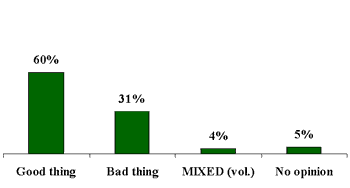 |
| Nov 8-10, 2002 |
Survey Methods
The latest results are based on telephone interviews with 1,014 national adults, aged 18 and over, conducted Nov. 8-10, 2002. For results based on the total sample of national adults, one can say with 95% confidence that the margin of sampling error is ±3 percentage points. In addition to sampling error, question wording and practical difficulties in conducting surveys can introduce error or bias into the findings of public opinion polls.
